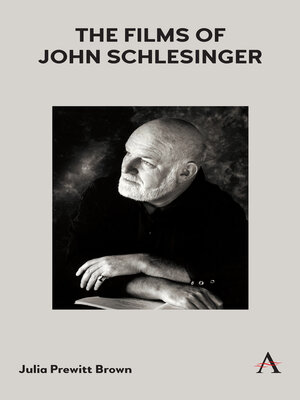
Sign up to save your library
With an OverDrive account, you can save your favorite libraries for at-a-glance information about availability. Find out more about OverDrive accounts.
Find this title in Libby, the library reading app by OverDrive.



Search for a digital library with this title
Title found at these libraries:
| Library Name | Distance |
|---|---|
| Loading... |
The city, with its manifold distractions and violence, its invitation to intoxication and dream, had long served to represent the experience of modernity in works of art at the time John Schlesinger made his acclaimed urban documentary 'Terminus' in 1961. To be a reader of the city was to be a reader of modern life, and Schlesinger was a discriminating, at times relentless, reader of the city throughout his career, especially in his three greatest films, 'Midnight Cowboy', 'Sunday Bloody Sunday' and 'The Day of the Locust', set in New York, London and Los Angeles, respectively. His character-driven stories, evocation of the significance of the everyday, and insistence on ambiguities of situation and motive – all qualities he was known for – point to literary influences that reach back to the nineteenth century and earlier. 'The Films of John Schlesinger' is not only the first book to fully acknowledge those influences, but also the first book to explicate the power of his art to capture the modern, urban experiences of becoming an adult in an atmosphere that relentlessly promotes fantasies of success and wealth; of coming to terms with one's national identity in the context of international politics; and of attempting to transform the past, both personal and cultural, into a viable present.
|The great historical and economic transformations of the late twentieth-century city are vividly reflected in John Schlesinger's oeuvre. In films of the early sixties 'A Kind of Loving' and 'Billy Liar', the city was imagined as industrial and residential, with the characters confronting life on the local and familial level. In 'Darling', 'Midnight Cowboy' and 'Sunday Bloody Sunday', films made from 1965 to 1971, the city had become cosmopolitan, ruled over by international finance and riven by class tensions. And in two films of the eighties 'The Falcon and the Snowman' and 'Madame Sousatzka', Schlesinger was emphatic in showing the desperation with which youthful characters struggled to come of age, not in a local urban environment, but in a national and global one. The specific economic and political forces driving these urban changes have been extensively treated in the growing body of scholarship on the 'cinematic city'. While these forces form an important backdrop to 'The Films of John Schlesinger' , the aim of the book overall is to demonstrate the centrality of Schlesinger's aesthetic imagination, but not as something divorced from political, moral and historical life.
The distinguished British cinematographer Billy Williams once described Schlesinger as the 'most complete' director he ever worked with. Schlesinger combined a directorial 'eye' (mastery of camera movement, framing, editing, production design, etc.) with a profound literary sense (understanding of character and situation). He began his career with the award-winning documentary 'Terminus' (1961) and went on to make a total of seventeen feature films and five films for television. Several of his films had a genuinely innovative impact: Andy Warhol said that 'Midnight Cowboy' 'took a real drawing card from the underground' in the way it dealt with 'forbidden subjects'. Pauline Kael described 'Sunday Bloody Sunday' as 'a novel written on film' and, in being so, an entirely new achievement, 'instantly recognizable as a classic'. Other Schlesinger films are also of lasting interest: 'Billy Liar', reissued by Criterion in 2001, is a comic gem. 'The Day of the Locust' is taught in film schools today. Yet there is a dearth of intelligent conversation about these rich works. Contemporary reviews by leading film critics are insightful, as are selected articles and the sole full-length study of...







